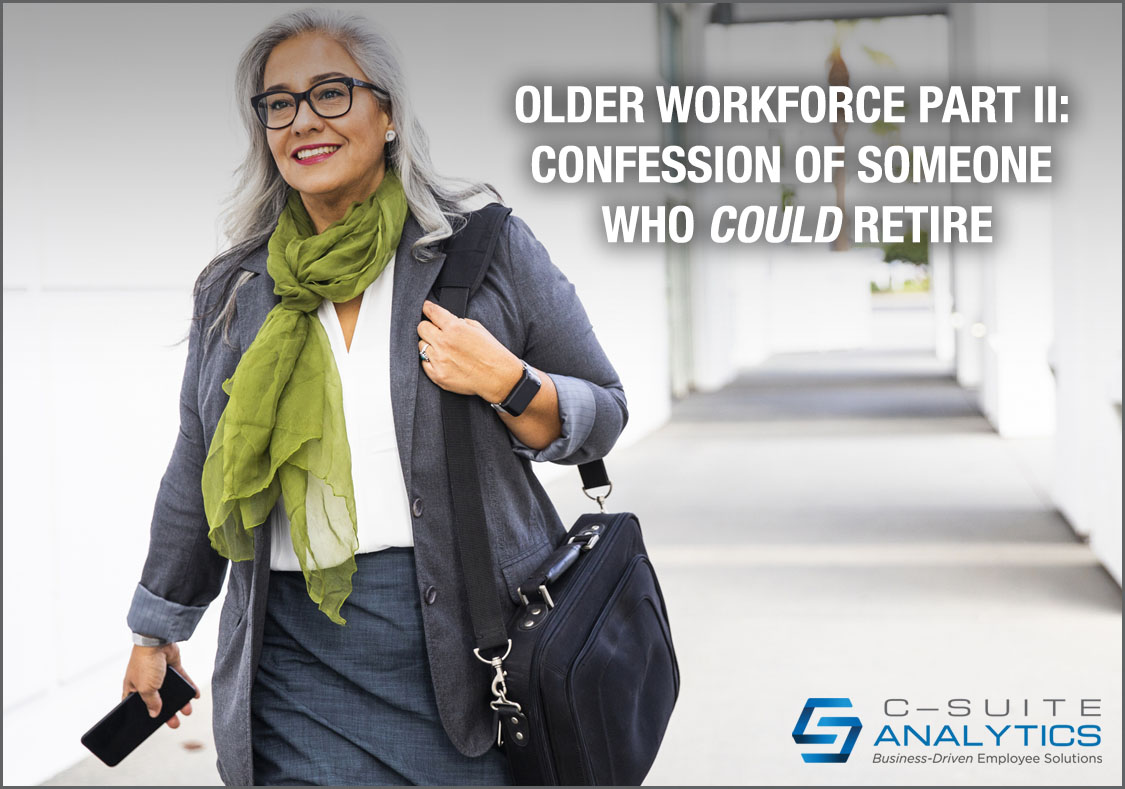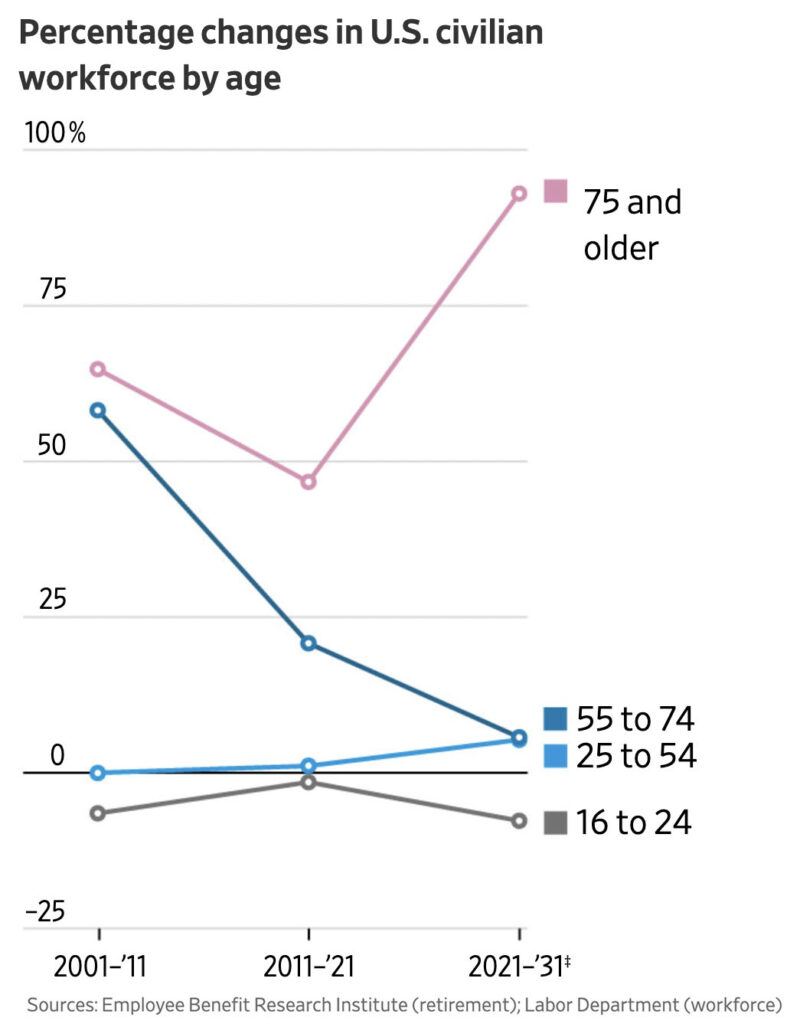Most hiring tools answer whether candidates can and will do the job, but not if they’ll stay. Learn how realistic job previews and motivational-fit interviews can improve retention from day one.
Older Workforce Part II: Confession of Someone Who Could Retire

Last week here I made a solid pitch here about why you should hire older workers, and sometimes in place of younger workers. Key points were…
- Research tells us these workers favor hard work, more-so than their younger peers.
- Reasons they continue to work are both to supplement retirement income and to have a scheduled, meaningful thing to do.
- Employers cite older workers’ flexibility and willingness to operate outside of the normal boundaries of their jobs.
- Baby-boomers stay with their employers an average of 8 years 3 months, more than double the duration of younger generations.
And data clearly tells us that those age 55+ are by far the fastest-growing group of available workers:

Older Workers Really Do Want to Go to Work
But writing as someone who is 55+, I realize how difficult it is for you, our reader, to imagine an applicant who could retire…or you might even say should retire…but would instead actually want a job and go to work. And to make this just a bit personal, there is no way when I was thirty that I would have predicted that I would work beyond what most people consider to be a normal retirement age. Yet I’m working this very minute.
So this piece is my convincing you, at whatever age you are, that many older workers not only want to work, but they want to work for a long time…regardless of their date of birth.
To get help forming my argument, I turned again to a Wall Street Journal report that profiled some older workers who describe why they are working.[i] It’s not too far-fetched to imagine these same stories coming from older workers in your organization, some of whom you know and maybe some you don’t.
These stories have been condensed.
Better Than Crossword Puzzles
I’ll retire at my funeral. At 70 years of age, I totally enjoy my practice as an investigative attorney concentrating in locating missing people, especially long-term absentees. This is more fun than doing crossword puzzles and cryptograms – although I enjoy those activities, too, when I have a spare moment.
The Karate Senior
For over 50 years, I owned a karate academy. The pandemic forced me to close the school. At 75, I thought my vocation would be over. Now I go to my clients’ homes, or they come to my house where I turned my garage into a functioning dojo (gym). My father passed away at 102 and God willing, I’ll live as long and continue to be inspired to teach.
An Energized Empty-Nester
I just re-launched my career in March, giving a twist to my prior track. With the new flexible workplace—one of the few positive outcomes of the pandemic—spending time with family, traveling and many of the jobs of retirement are now available to the working. Also, my financial adviser recommends planning to live to 100. Why quit?
A Lesson in Life and Death
My father told his father to retire at 66. The day my grandfather turned in the keys to his office he suffered a stroke. He died three days later. My father, who was just 33 at the time, blamed himself, thinking that he had forced his father into becoming a useless member of society.
My father is 88 now, and a doctor. Had it not been for the pandemic, he would still be working today. I can see how much finally being forced to end his working life has impacted him. I believe there is room for old-timers for a long time, and this will only get better as virtual reality and artificial intelligence facilitate the application of experience. No to retirement. I refuse to die.
No Purpose, No Value
One day, you turn that part of your life off. OK, income loss aside, what are you going to do now? Get caught up on home projects? OK, after a couple of weeks, couple of months those items are taken care of.
My wife retired several years ago. She now believes it was one of the worst decisions of her life. So for me, that answer is: Keep working as long as I enjoy the work itself and until I get handed my hat and shown the door.
Motivated by Fear
While I would really like to retire – as much for my wife as myself – I am so scared of not having enough money. I just do not see any way I can. I believe that I will have to be working to 70 at least. At times I worry about my wife and me. I have heard of plenty of couples who, when they retire, find they have nothing in common, and that scares the crap out of me.
Finally In Control
I started formally working at 14. As I sit here today, age 73 and feeling like 30, I simply cannot imagine not working. I just enjoy it too much. I enjoy being relevant, productive and making contributions. I enjoy being happy. I will continue to work as long as I am in control. Slowing down—YES. Changing how I work—ABSOLUTELY. Actually retiring—NEVER!
A Self-Called Type A Weirdo
“When I’m on the other side of the grass” is what I tell my colleagues. I’m a competitive Type-A adrenaline weirdo so the usual retirement pursuits leave me bored. I thrive on chaos, confusion, and disorder at work.
Listening to Myself When it Comes to Work
I have identified four “handrails” that are important to me in any transitional period I consider: (1) purpose, (2) structure, (3) financial security, and (4) health. Looking closely at my current work, I recognize that all four of my handrails are in place supporting me. Which makes sense as I am very happy doing what I am doing and have no plans to retire. Ever.
So how do you find older workers? Here are my top-3 favorites:
- Leverage employee referrals by asking older workers who else they know. Research tells us employee referrals stay longer and perform their jobs better.
- In job advertisements replace “high potential: and “energetic”…code words for young…with terms like mature, experienced, and reliable.
- Also mention flexible schedules and remote work options if your job permits.
Perhaps the best way to recruit older workers though is to look upon their applications with a smile versus a frown…and drive a “support-older-workers” culture throughout your company.
Let’s end by recalling that the reason you subscribe to our Targeted Turnover blog is to help you cut turnover and improve retention. Hiring older workers will help you do so.
Does your C-Suite need a wakeup call on how much turnover is actually costing you? Turnover is not an HR problem, it’s a leadership problem at each leadership level from the bottom up. Schedule a conversation with me at DFinnegan@C-SuiteAnalytics.com to discuss your turnover challenges and I’ll share how you can use dollars instead of percentages to deliver your C-Suite team a wakeup call! Or I’ll do it for you as we’ve proven in every industry that you can cut turnover by 20% and more.
[i] https://www.wsj.com/articles/when-will-i-retire-e3750715



